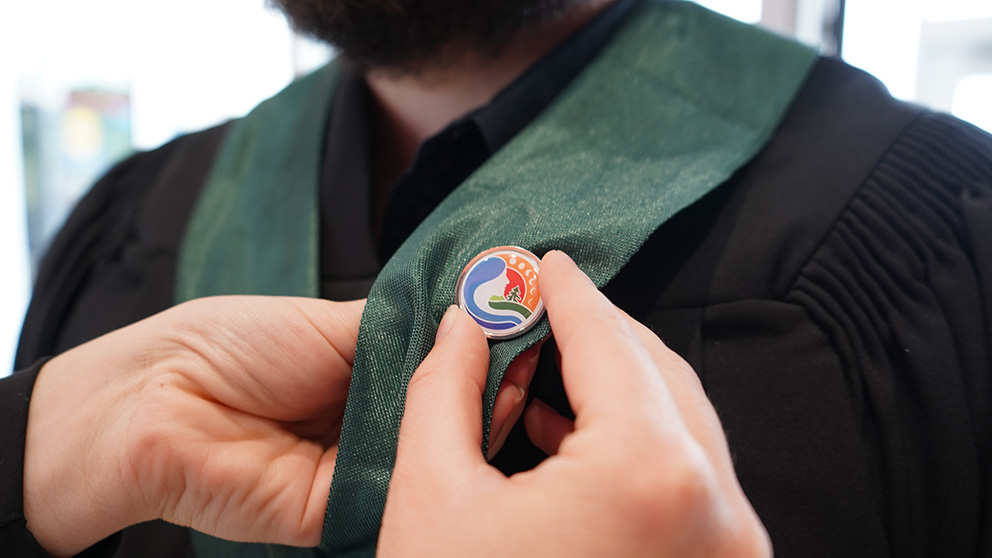Indigenous Knowledge And Studies
Fleming’s Indigenous Knowledge and Studies engages students with aspects of Indigenous people’s knowledge, perspectives, and experiences that relate to the discipline of study and to the shared history and experience as individuals living in Canada.

Fleming’s Indigenous Perspectives and Program teams are committed to providing high quality and vocationally specific educational opportunities for all students that draw upon Colleges and Institutes Canada’s Indigenous Education Protocol, the Truth and Reconciliation Commission’s Calls to Action and the United Nations Declaration on the Rights of Indigenous People.
All of our Indigenous courses are taught by Indigenous faculty.
Fleming College is a proud signatory of Colleges and Institutes Canada’s Indigenous Education Protocol (IEP). The Protocol affirms the College’s commitment to Indigenous education. This includes inclusivity of Indigenous cultures, the elimination of barriers to education, and meaningful actions to better serve Indigenous peoples.
Unique in Ontario, the Indigenous Perspectives Designation (IPD) provides both Indigenous and non-Indigenous students with discipline-specific knowledge of First Nations, Metis and Inuit peoples including their cultures, histories, traditions, and contributions to our shared society. Students take Indigenous Studies courses within their program and participate in culturally appropriate events and activities in Indigenous communities. They graduate with the Designation, an in-demand credential for their career.
Graduates of a Fleming College program with an IPD will demonstrate the ability to:
- Analyze the historical and contemporary impacts of colonialism in the student’s chosen field.
- Distinguish the historical and contemporary Nation-to-Nation relationship between Indigenous and non-Indigenous peoples in the student’s chosen profession.
- Differentiate the cultural, political, social, and community diversity of Indigenous peoples within the context of Indigenous territories and the student’s location of employment.
- Synthesize key foundational concepts of Indigenous knowledge, thought, and world views, to meet the needs of non-Indigenous and Indigenous audiences in the student’s vocation.
- Articulate relevant events, situations, and issues within the shared history of Indigenous and non-Indigenous peoples and the student’s vocation.
- Systematically explore the contributions Indigenous peoples have made, and continue to make, to society and the student’s chosen field.
- Evaluate how Indigenous conceptualizations, realities, and ways of being in the world connect to the student’s own life experiences, and critically apply this knowledge within the context of the student’s employment choices.
We are committed to not only full-time program delivery on-campus, but also the delivery of programs within Indigenous communities. We can customize programs tailored to your unique needs within your community.
We invite interested communities to contact us if you would like to partner on program delivery for the programs below, or any others we offer.
- We have partnered with Kenjgewin Teg on Manitoulin Island (Mnidoo Mnising) to expand access to post-secondary programming. Fleming’s Practical Nursing and Pre-Health Sciences Pathway programs are offered in the community with clinical learning taking place on site with key local health care providers.
- Fleming has worked with Waubetek Business Development Corporation to develop and deliver the Aquaculture Foundations Program to First Nation communities across multiple provinces.
- Fleming has successfully developed, delivered and credentialed Educational Support Workers of the Wikwemikong Board of Education, Wiikwemkoong First Nation
Fleming College and Trent University have partnered to provide a pathway for Fleming students into Trent’s Indigenous Bachelor of Education (B.Ed.) program, a unique five-year concurrent degree that puts Indigenous Knowledge and perspectives at the forefront of teacher training. Eligible graduates of select programs will be given advance standing – five credits toward the 25 credits total – in the Indigenous B.Ed. program at Trent. The eligible programs are:
- General Arts and Science – Degree Transfer
- Ecosystem Management Technology
- Environmental Technology
- Fish and Wildlife Technology
Students from Fleming who are applying for admission to the Indigenous B.Ed. program will be required to self-identify as First Nations, Métis, or Inuit.
In partnership with Trent University, we offer a pathway for Fleming students into Trent’s Indigenous Environmental Studies and Sciences (IESS) program. Eligible graduates of Fleming’s School of Environmental and Natural Resource Sciences diploma programs will be given advanced standing in the degree program with credits towards one of two options: a Bachelor of Arts in Indigenous Environmental Studies or a Bachelor of Science in Indigenous Environmental Science.
IESS is an innovative, multi-disciplinary program that brings together principles of both Indigenous Knowledge and Western science with the goal of addressing the complex environmental problems facing Indigenous communities, governments, business, industry, research and society.